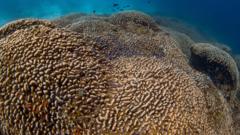The recently found mega coral, larger than a blue whale, brings both awe and concern as researchers emphasize the urgent need for protection against climate change's adverse effects in the Solomon Islands and beyond, coinciding with ongoing global climate discussions.
Discovery of World's Largest Coral Highlights Urgent Need for Climate Action

Discovery of World's Largest Coral Highlights Urgent Need for Climate Action
Scientists have discovered the largest coral ever recorded in the southwestern Pacific Ocean, underscoring the importance of coral ecosystems in the fight against climate change.
The largest coral ever recorded has been found in the south-west Pacific Ocean, marking a significant discovery by scientists. This remarkable mega coral is described as a collection of numerous tiny creatures working together as one organism, rather than a traditional coral reef. Estimates suggest that the coral, located in the Solomon Islands, could be more than 300 years old and, measuring 34 meters wide, it surpasses even the size of a blue whale.
The coral was identified by Manu San Felix, a videographer aboard a National Geographic ship, during an expedition exploring the effects of climate change in remote Pacific locations. San Felix, accompanied by his son, described the moment as akin to discovering a “cathedral underwater,” evoking deep respect for the ancient organism that has thrived over centuries.
A team of scientists joined San Felix to measure this colossal coral with a special underwater tape measure, and the dimensions revealed its grandeur: 34 meters wide, 32 meters long, and 5.5 meters high. This discovery comes amid growing concerns as global coral populations face significant threats from warming oceans—issues highlighted during the recent UN climate talks, COP29, in Baku, Azerbaijan.
Trevor Manemahaga, the climate minister for the Solomon Islands, expressed pride in this discovery, emphasizing the critical role that coral ecosystems play in the economic survival of small island nations. He stated, “We rely mostly on marine resources for economic survival, so coral is very, very important.” Manemahaga further noted the devastating impacts of climate change in his country, including stronger cyclones and coastal erosion.
In light of these vulnerabilities, many developing nations are advocating for increased financial support from wealthier countries to bolster their climate change strategies. The Solomon Islands, reliant on logging for a substantial portion of its annual export revenue, faces environmental repercussions that can compromise coral health, highlighting a pressing need for economic diversification.
According to Eric Brown, a coral scientist with National Geographic, the newly discovered coral is currently in "pretty good" health, contrasting with nearby shallow reefs that have suffered due to warmer sea temperatures. This largest example of Pavona clavus not only serves as a sanctuary for various marine species such as shrimp and crabs but also offers a historical perspective on oceanic conditions over time.
As recent reports reveal that 44% of corals in warmer waters are at risk of extinction—a significant rise since 2008—this monumental finding shines a light on the critical importance of protecting our oceans. Scientists intend to further study the coral to deepen their understanding of its growth patterns and resilience against climate change's effects, reiterating the essential nature of these ecosystems in our global environment.



















